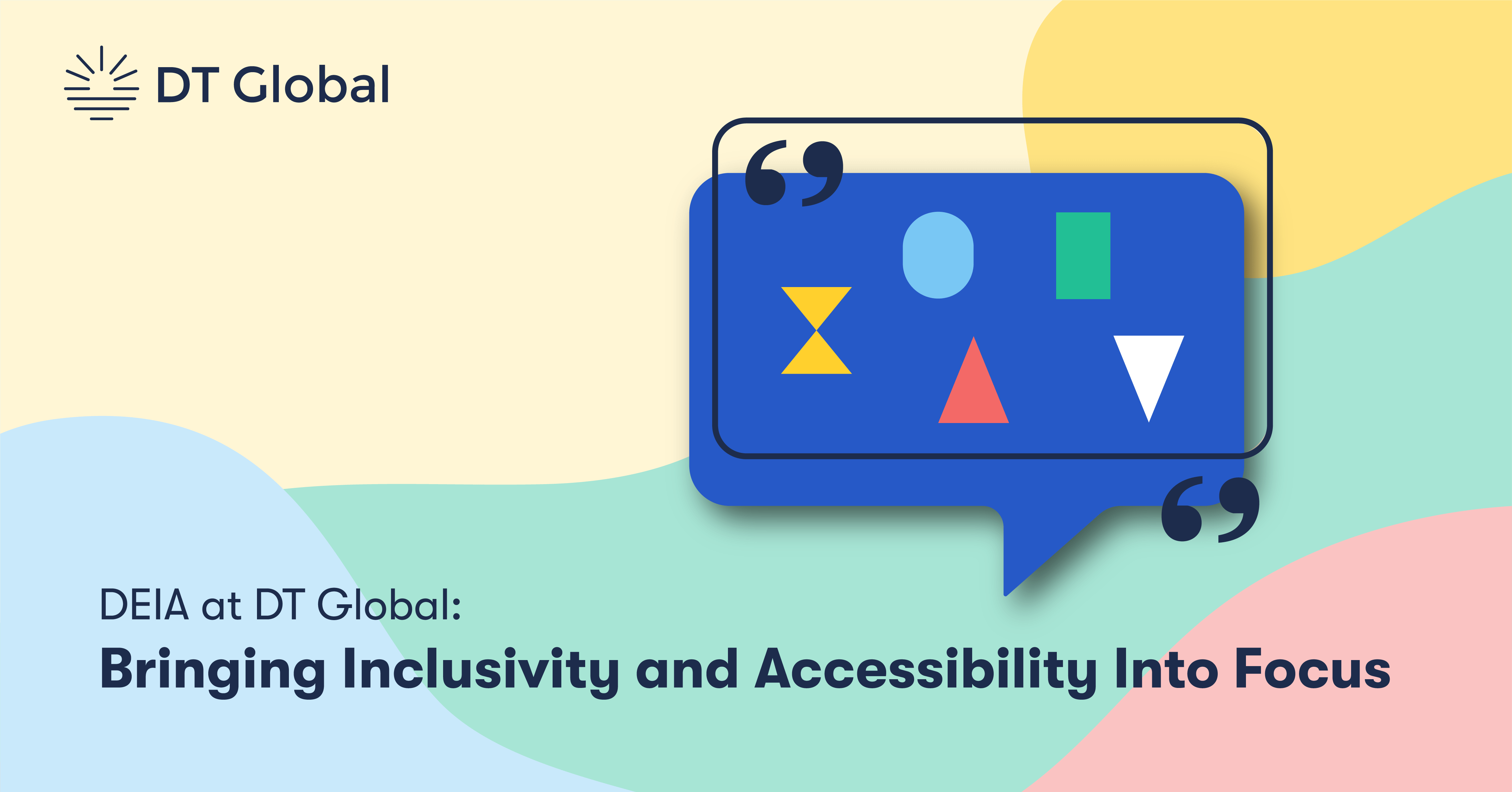
Diversity and equity initiatives have become ubiquitous throughout organizations around the world. Slowly but surely, we are seeing change everywhere towards dismantling oppressive policies and systems. At DT Global, this has so far included updated hiring practices that help create diverse field and home office talent pools, providing paid internships to remove financial barriers, and expanding professional development programs for employees.
DT Global is a people first organization—we value our staff as the most important part of our organization. We prioritize and praise the differences amongst our colleagues. We are One DT Global with a rich variety of experience, knowledge, and abilities and that is to be celebrated and encouraged. However, attracting and supporting employees through our diversity and equity initiatives is not the only goal—we also want to create an environment that is inclusive and accessible.
Accessibility refers to whether a place is easy to navigate for everybody. For example, people with mobility devices can move freely or documents are compatible with screen readers for people with impaired or no sight. Inclusion, on the other hand, refers to how people feel within this place. This would mean every person feels safe expressing their identity in whatever form that takes. We strive to create a corporate environment that is accessible and welcoming to people of all abilities and all life stages. Inclusivity and accessibility are equal pillars within DT Global’s core values.
During our recent relocation of the US office to Arlington and subsequent revitalization of our in-office presence, I was given a chance as part of the Office Move Team to consider the IA half of DEIA in various aspects of our office design and new in-person work style.
Throughout the office, all meeting rooms and office spaces have been labeled with high-contrast, large print signage indicating the room name or number. For the more prominent spaces, we have included braille on these room signs, and we plan to update the remaining signage to match. And being a loft-style space across two floors, we have an internal elevator connecting the two levels.
Because it’s no one’s right to assume how every body functions, we provide free menstrual hygiene products in every bathroom space, including those that are male-designated. Additionally, there are two bathrooms which are single occupancy—meaning they have a single toilet—so we redesignated these as gender neutral.
On each floor of the office, we have dedicated a Wellness Room. These rooms are fully enclosed with light switches and locks on the doors, offering private space for anyone who needs it. One of these rooms is prioritized for lactation purposes and it offers a small refrigerator and a sink. The other Wellness Room has a sign pointing towards Mecca and a rug, to give space for prayer and meditation. And either room can be used as a retreat from bright lights or crowded spaces if a person becomes overstimulated.
As face-to-face interactions become more frequent, it’s also become apparent that social skills and expectations have changed. The joke that we are “out of practice” at being social is apparently rooted in truth. Our conversational skills have gotten rusty and our tolerance for offensive or rude interactions has decreased, particularly as the workforce becomes more introspective and focused on social growth.
Sensitivity training has historically been used as a reactive solution to interpersonal conflict. Given the changes in how people interact and the increased awareness of social issues, it’s time to use sensitivity training as a proactive tool. Most people know to never comment directly on colleagues’ appearances, but it’s just as important to not joke about weight gain or loss, even for one’s self. Providing non-alcoholic options at work events is now typical, but pressuring colleagues to have alcohol—when they could be pregnant, in recovery, or have religious practices that prohibit substance use—is still considered congenial when it should be thoroughly discouraged.
Inclusive spaces and accommodations must be made for everyone, regardless of their situation and whether their needs are visible. A person can strive to be considerate, but no one is able to understand every possible perspective or struggle, so faux pas are inevitable. However, faux pas can and should be mitigated with regular education on topics our teammates may experience, from substance dependence or religious practices to mental health issues.
Formal training on issues around accessibility and inclusivity can go a long way. But they are not the only way and can certainly take some time to organize. So, what can we all do in the meantime to make sure our teammates feel welcome, safe, and considered?
Impact is more important than intent. Before speaking, consider whether your words are appropriate and considerate. A comment may have been intended as harmless, but to anyone else nearby, it may be far from harmless. If you are confronted about a comment being insensitive, try to not become defensive and instead try to learn from the experience and grow. To err is human, to forgive—one’s self and others—is divine.
We must all do our part to minimize the effects of social blunders. Even when not directly affecting you, if you know a comment to be harmful then you should speak up to the person to help them understand. Educating our colleagues should not burden the affected persons alone. That being said, it’s important to let affected staff lead—they may want to speak up on an issue, or may not be bothered by it. It is everyone’s responsibility to grow and learn together.